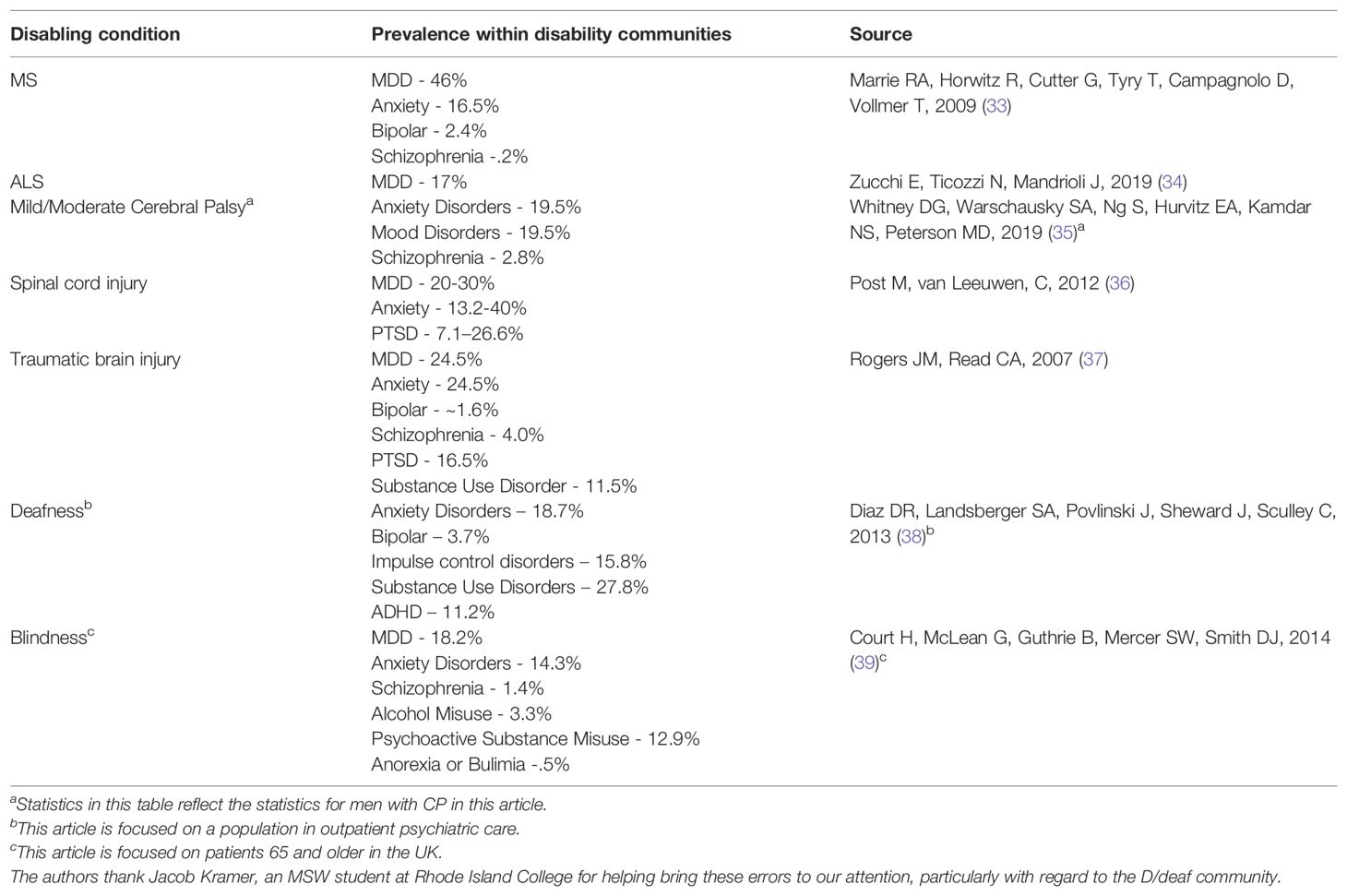- 1Stanford University, Center for Biomedical Ethics, Stanford, CA, United States
- 2Department of Medical Ethics & Health Policy, University of Pennsylvania, Philadelphia, PA, United States
- 3Department of Psychiatry, University of California, San Francisco, San Francisco, CA, United States
- 4Sage Integrative Health, Berkeley, CA, United States
- 5COMPASS Pathways, London, United Kingdom
A Corrigendum on
Physical disability and psychedelic therapies: an agenda for inclusive research and practice
By Mintz KT, Gammer B, Khan AJ, Shaub G, Levine S and Sisti D (2022) Front. Psychiatry 13:914458. doi: 10.3389/fpsyt.2022.914458
In the published article, there were errors in Table 2. The authors wish to correct the errors and clarify data presented in Table 2, pertaining to the prevalence of mental illness in several populations.
Under “Mild/Moderate Cerebral Palsy”, the data in column 2 refer to men only. A footnote has been added to clarify this.
Under “Spinal cord injury”, the data in column 2 were reported as 7.1–26.6% and 13.2-40% for Anxiety and PTSD, respectively. The correct values are 13.2–40% and 7.1–26.6%. The table has been updated to reflect this.
Under “Deafness”, the data for Substance Use Disorder in column 2 reflect a population in outpatient psychiatric care. A footnote has been added to clarify this.
Also under “Deafness”, the data in column 2 were reported as 30.1%, 14.2%, 5.2%, 48.4% and 4.9% for Anxiety, Bipolar, Impulse control disorders, Substance Use Disorders and ADHD, respectively. The correct values are 18.7%, 3.7%, 15.8%, 27.8% and 11.2%. The table has been updated to reflect this.
Under “Blindness”, the data in column 2 refer to patients older than 65. A footnote has been added to clarify this.
The corrected Table 2 and its caption appear below.
The authors apologize for these errors and state that this does not change the scientific conclusions of the article in any way. The original article has been updated.
Publisher’s note
All claims expressed in this article are solely those of the authors and do not necessarily represent those of their affiliated organizations, or those of the publisher, the editors and the reviewers. Any product that may be evaluated in this article, or claim that may be made by its manufacturer, is not guaranteed or endorsed by the publisher.
Keywords: physical disability, sensory disability, psychedelic therapies, ethics, structural ableism in healthcare, justice, inclusion in clinical research
Citation: Mintz KT, Gammer B, Khan AJ, Shaub G, Levine S and Sisti D (2024) Corrigendum: Physical disability and psychedelic therapies: an agenda for inclusive research and practice. Front. Psychiatry 15:1523364. doi: 10.3389/fpsyt.2024.1523364
Received: 05 November 2024; Accepted: 22 November 2024;
Published: 23 December 2024.
Edited and Reviewed by:
Marijn Lijffijt, IonTX, Inc, United StatesCopyright © 2024 Mintz, Gammer, Khan, Shaub, Levine and Sisti. This is an open-access article distributed under the terms of the Creative Commons Attribution License (CC BY). The use, distribution or reproduction in other forums is permitted, provided the original author(s) and the copyright owner(s) are credited and that the original publication in this journal is cited, in accordance with accepted academic practice. No use, distribution or reproduction is permitted which does not comply with these terms.
*Correspondence: Kevin T. Mintz, a21pbnR6QHN0YW5mb3JkLmVkdQ==
 Kevin T. Mintz
Kevin T. Mintz Brinn Gammer
Brinn Gammer Amanda J. Khan
Amanda J. Khan Gretchen Shaub
Gretchen Shaub Steven Levine5
Steven Levine5 Dominic Sisti
Dominic Sisti